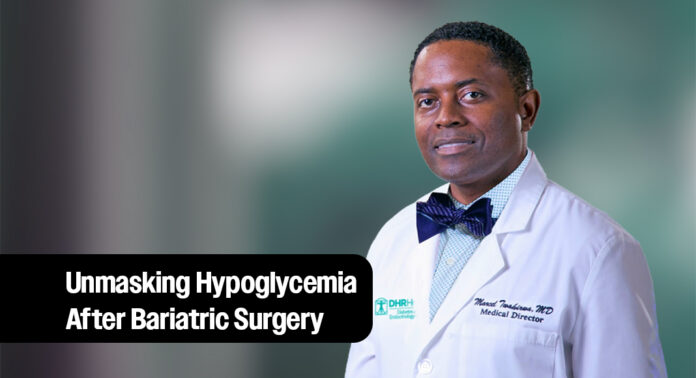Mega Doctor News
By Roberto Hugo González
Hypoglycemia— when blood sugar drops too low— can be a surprising and serious complication after bariatric surgery, especially a procedure called Roux-en-Y gastric bypass. Although rare, it can cause life-altering symptoms in patients. Dr. Marcel Twahirwa, Medical Director at DHR Health Diabetes and Endocrinology Institute in Edinburg, Texas, recently spoke about this condition and why it deserves more attention.
Dr. Twahirwa has dedicated his career to diabetes care and education. After completing medical training in Mexico, he went on to finish his internal medicine residency at New York Medical College’s Metropolitan Hospital and a fellowship in endocrinology at the University of Pennsylvania. Today, he is a leading voice in diabetes and metabolic care in South Texas.

“There’s not much solid evidence when it comes to hypoglycemia following bariatric surgery,” he said. “It’s one of the known complications, but still poorly understood.”
One of the key issues after bariatric surgery is something called dumping syndrome. This comes in two forms: early and late. Early dumping syndrome happens within the first hour of eating. Patients may experience symptoms such as flushing, nausea, bloating, lightheadedness, or a racing heart. This is usually because food moves too quickly from the stomach into the small intestine, causing a fluid shift.
Late dumping syndrome, on the other hand, happens one to three hours after a meal. The body absorbs glucose quickly, resulting in a rapid increase in blood sugar. That’s followed by a surge of insulin, which then drives blood sugar down too far, resulting in hypoglycemia.
While past studies estimated that only about 2 to 3 percent of patients experienced this complication, newer technology suggests the problem may be much more common. “Using continuous glucose monitors, we’re seeing that up to 70% of patients may have some degree of low blood sugar after surgery,” Dr. Twahirwa explained. Yet, data from institutions like the University of Virginia and the Mayo Clinic still show lower numbers, ranging from 2.4 to 2.6 percent. “So fortunately, post-bariatric hypoglycemia isn’t highly prevalent. That said, it does seem quite common based on the number of referrals I get from my colleagues just across the street.”
Why does this happen? After surgery, the body’s hormone response to food changes, especially hormones called incretins, which help control blood sugar. The two main incretins are GLP-1 and GIP. In a healthy person, these hormones trigger the release of insulin when needed and help maintain balanced sugar levels. But after gastric bypass surgery, GLP-1 levels can spike dramatically. “There’s a significant increase in incretin levels— particularly GLP-1— following surgery,” Dr. Twahirwa said. “This exaggerated GLP-1 response leads to excessive insulin secretion, which can result in postprandial hypoglycemia.”
GIP, produced in the upper intestine, doesn’t seem to have the same effect. “Multiple studies have shown that GIP levels don’t significantly differ between affected and unaffected patients,” he added. As a result, most research focuses on how GLP-1 may contribute to the problem.
Diagnosing post-bariatric hypoglycemia can be tricky. There’s no single test that everyone agrees on. Some doctors use an oral glucose tolerance test, which is easy to repeat but not very realistic. Others use a mixed meal test, which mimics a real-life meal but varies from clinic to clinic. Different amounts and types of carbohydrates make it hard to compare results. “There is no agreement on how even to make a diagnosis of post-gastric bypass hypoglycemia,” Dr. Twahirwa said.
When it comes to treatment, the first and most important step is changing the diet. This can be hard for patients to understand. “They come to you, they’re crashing, and you’re going to tell them not to eat sugar— they look at you like you’ve lost your mind,” he said. However, the goal is to avoid foods that cause rapid blood sugar spikes, simple sugars, and excessive fluids during meals. Eating more protein and fiber helps slow digestion and keep blood sugar stable. Patients are also encouraged to eat smaller, more frequent meals.
If diet changes don’t work, medications can help— but there’s no perfect solution. One option is acarbose, a drug that slows the rate of sugar absorption in the gut. It’s not widely used because it can cause gas and bloating, but it’s the most studied medication for this condition. In one small study, 21 out of 25 patients had complete relief from symptoms after six months.
Another medication, diazoxide, works by limiting the amount of insulin the pancreas releases. It’s only been studied in a few small trials. Drugs like octreotide and pasireotide, which are used to treat hormone-related disorders, have also shown promise. They work by slowing stomach emptying and reducing hormone release after eating. A 2014 study found that pasireotide helped maintain stable blood sugar levels in some patients.
There are also exciting new treatments being researched. One is Exendin 9–39, which directly blocks the GLP-1 hormone. “A recent study from Stanford tested Exendin 9–39 in 19 post-bypass patients,” Dr. Twahirwa shared. “None required glycemic rescue after three days of injections.”
Another drug being explored is canagliflozin, a diabetes medication that affects sugar absorption in the gut. It may reduce blood sugar spikes after meals. A small study from Barcelona showed that it helped some patients with late dumping syndrome.
More advanced technologies are also being tested. One promising example is a closed-loop glucagon system developed at Harvard. This device monitors blood sugar and gives tiny doses of glucagon— the hormone that raises blood sugar— when levels get too low. Early results show it may prevent both early and late hypoglycemia episodes.
In 2020, a panel of international experts released consensus guidelines on managing this condition. They agreed that dietary changes are the best first step. Medications should be used if symptoms persist, but there’s still no clear, evidence-based protocol. “There’s more to be done with this. There’s more research that is needed,” Dr. Twahirwa said. “As more bariatric surgeries are performed, more patients will require intervention, and hopefully, we’ll have better therapies available soon.”
Post-bariatric hypoglycemia is a complex but treatable condition. With more awareness, careful management, and new research, there is hope that patients struggling with this problem can find lasting relief and improve their quality of life.
See related story:










